Private Sector Engagement Strategy for refugees in hosting districts.
The Comprehensive Refugee Response Framework (CRRF) is a coordination model that was declared by the UN General Assembly in 2016. This was a result of the massive influx of refugees to countries. In Uganda, the CRRF aims to put the Government as the lead of the Refugee response to enhance the Humanitarian and Development Nexus, strengthen coordination and bring on board the host communities hitherto not considered in the response.
The CRRF has five pillars and specifically, the pillar on resilience and self-reliance focuses on Private Sector engagement among others. The concept of self-reliance lies at the core of Uganda’s model of hosting refugees, aligning with the Global Compact for Refugees (GCR) and the Comprehensive Refugee Response Framework (CRRF). Better access to appropriate, sustainable livelihoods and skilling opportunities promotes long-term peaceful co-existence between refugees and host communities and sustainable development of the country as a whole.
Accordingly, MoFPED in conjunction with OPM developed a Private Sector Engagement Strategy. It is a framework with an integrated strategic planning and performance management system that communicates a vision, mission and objectives to the private sector and other stakeholders. It prioritises initiatives, and interventions and uses strategic performance measures to benchmark progress, which will drive progress in the efforts to enhance participation by the refugee hosting districts.
Above was the farewell of Ms. Insa Nieberg, the outgoing Humanitarian Development Peace (HDP)Nexus Advisor (GIZ), and the welcoming of Ms. Melanie Axiotis, her successor.


